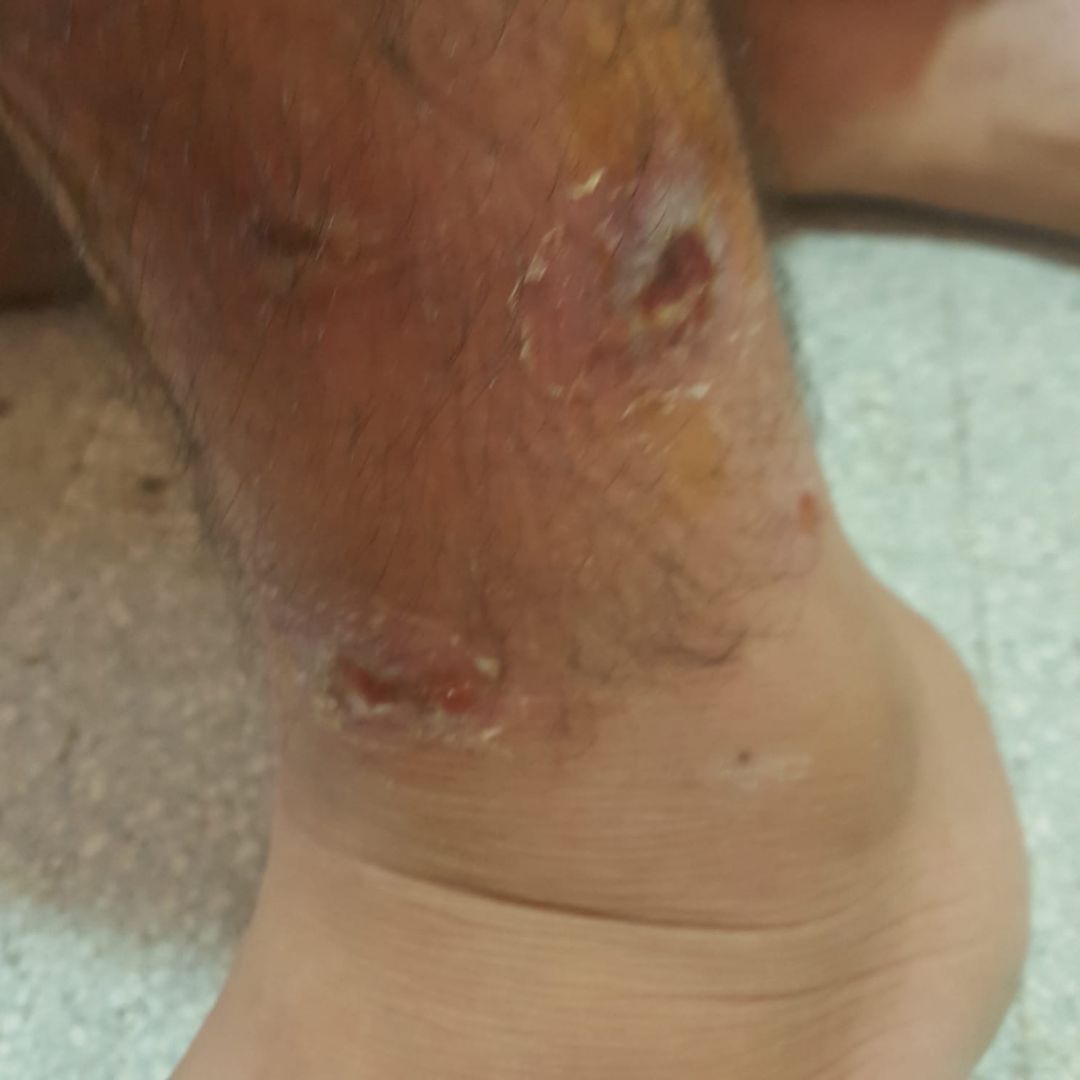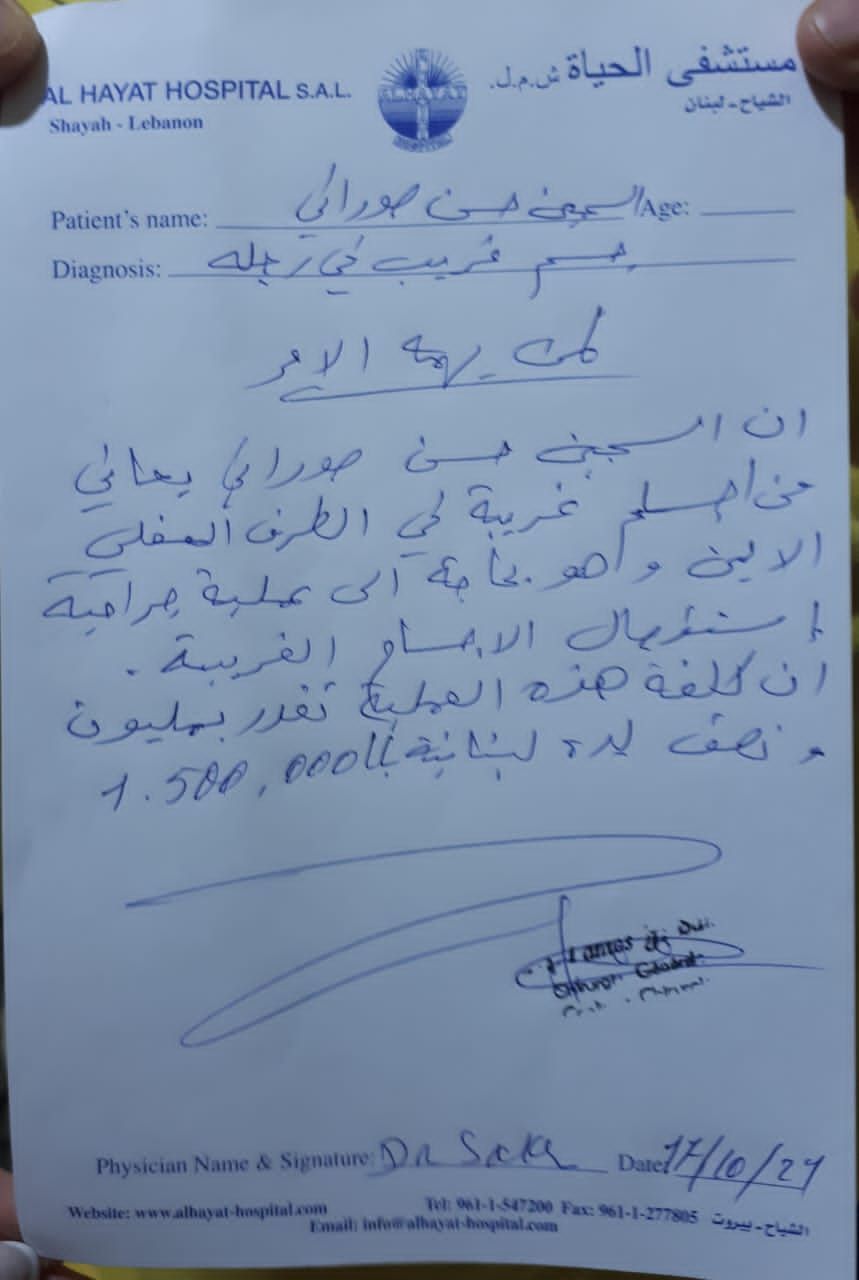Lebanese prisons: Sitting on a powder keg
Lebanese prisons: Sitting on a powder keg
Lebanese inmates have no medical treatment, little food to eat, and suffer from overcrowded cells in all 25 prisons, which lack maintenance, sanitation, ventilation and air conditioning due to electricity outages.
Inmates represent 323% of all prisons’ capacity, as their number reached more than 8,000 prisoners, including 20.9% convicts, said Lebanese caretaker Minister of Interior Bassam Mawlawi in a press conference on August 30. According to NGOs, 50% of the inmates have been imprisoned in Roumieh prison.
The issue of the unbearable conditions of the Lebanese prisons is a ticking bomb that could explode at any time amid accumulated crises financially and socially resulting from the coronavirus pandemic and the Port of Beirut explosion on August 4, 2020.
‘7 deaths in one month’
“In only one month, seven prisoners died […] and recently two inmates died; one of them passed away due to [medical] malpractice,” said Lebanese human rights lawyer Mohamed Sablouh, who is a defender of victims of torture and arbitrary detention.
In comments to Jusoor Post, Sablouh said that human rights activists called upon the Ministry of Interior to launch an urgent investigation into the deaths. However, nobody opened any probes, he added.
“Human rights activists, including me, warned that the Lebanese prisons are almost collapsed,” he said, adding, “There is no medical care at all. No surgical operation was conducted for a prisoner. In December 2021, an urgent heart operation was required for one of the prisoners but the surgery costs were demanded in dollars. [However,] we managed to collect the required money, but on the same day of the operation, he [the inmate] passed away.”
The lawyer also provided Jusoor Post with copies of receipts of costs for medical operations and medical reports about some inmates’ health conditions. A prisoner named Khaled Taleb Zidan needed an urgent gallbladder removal surgery, at a cost of 11 million lira ($7,278). Meanwhile, Ghassan Salibi, another inmate, was suffering from a mitral valve prolapse and the costs of surgery was estimated at $7,500.
.jpeg)
Furthermore, other prisoners have suffered from rashes and sores on their skins without diagnosing this disease
.jpeg)
It was reported by some local media that an “unknown virus” was behind the deaths. However, Al Markaziya reported anonymous sources saying that one of the dead people passed away due to a heart attack while the second died of health problems at a hospital.

Lebanese Prime Minister-designate Naghib Mikati asked the Ministry of the Interior to "conduct an immediate and urgent investigation" into allegations of the death of some prisoners as a result of deteriorating health conditions in Roumieh Central Prison, Al Sharq Al Awsat newspaper reported.
The most recent death was of a detainee named Bashar Abou Soud, who was tortured to death by forces of the State Security Service’s regional office in Bint Jubeil, southern Lebanon. The National Human Rights Commission in Lebanon “strongly” condemned the killing of the detainee.
The commission said in its statement on September 3 that the investigations showed that law enforcement agencies in Lebanon are still applying prohibited practices that should be abandoned under international agreements and national laws.
“The brutal scenes of torture committed against the detainee Abdel Saud reminds us of the danger of impunity that was perpetuated mainly by the Lebanese judiciary,” the commission said.
The commission called for freezing all the State Security Services’ activities in all its offices and should only be in the Central Detention Center.
‘Malnutrition’
“Due to the economic crisis, the ministries of interior and defense could not ensure enough food for prisoners. They provide few quantities with bad qualities,” said Sablouh, noting that the relatives of the prisoners also find it unaffordable to buy food from the prisons’ cafeterias, and at the same time it is not allowed for them to send food to prisoners.
To address the shortage of food supplies, two decrees were signed by the caretaker Minister of Finance and ratified by the President allocating 20 billion Lebanese Liras ($13,2 million) to provide foodstuff to prisons nationwide, said Minister of Interior Mawlawi during the August 30 conference.
He added that some portions of food were given by the Ministry of Interior to the prison sector in aid, noting that the ministry would convene a press conference for all health care organizations - local or international - to help treat sick prisoners.
Prisonbreaks
On August 11, the Interior Security Forces (IFS) arrested four among 31 prisoners who escaped from Adliya Prison in Beirut, which is one of the other prisons that lack human services. The escaped inmates sawed a window in the prison.
A few days later, the IFS stated on August 28 that some inmates at Roumieh prison went on hunger strike demanding to commute the imprisonment year from nine months to six months.
It added that a group of inmates who went on a hunger strike “claimed” that they were sick and asked to go to a hospital for treatment. “Upon their arrival at the hospital, they incited chaos, and when some security forces interfered to end it, some of the inmates took video footage showing that they are living in a very bad situation to incite the public opinion,” the statement read.
Afterward, the security forces controlled the situation and inspected the whole building of the prison and found 12 cell phones, 15 chargers, headphones and a large number of bladed iron tools, the statement said.
The prison administration has been criticized by human rights activists for having personnel who are not well-trained to deal with prisoners. Although the prison is a place for rehabilitation, some inmates turned into criminals after serving their terms due to the bad administration.
Commenting on the latest prison break attempt, Mawlawi said that it was necessary to inspect the prison’s cells by security forces, adding that 51 knives were found in just one building.
Judges can solve the problem
The only solution to this problem boils down to the hands of the lawmakers who were accused of procrastinating the legal procedures because of their personal interests.
The Minister of Interior called upon judges to accelerate the trial procedures to address the issue of crowding cells, saying that if judges applied Article 108 of the Criminal Code, at least 1,000 prisoners who are on demand would be released.
“According to article 108 paragraph 1 of the Lebanese code of criminal procedure, pre-trial detention is limited to two months (renewable once if absolutely necessary) for misdemeanors (except if the defendant had already been sentenced to at least one year in prison). Article 108 paragraph 2 provides that pre-trial detention is limited to six months in criminal matters (renewable once by a motivated decision), with exception of homicides, cases involving drugs, the State’s security or terrorism,” Article 108 stipulates as translated by Defense Wiki.
The minister also called for granting amnesty for prisoners to ease the problem of overcrowding, adding that he met with Parliament Speaker Nabih Berry and discussed reducing the imprisonment year.
As per a bill announced by the minister, the years of punishment shall be commuted to 25 years in jail for the death penalty and 20 years for the life sentence, besides making the year of jail to be six months instead of nine months.
“Prisons are not enemies […] we put a solution to the overcrowding,” he said, adding, “We say to the inmates’ relatives that we are not forgetting their sons.”
Sablouh told Jusoor Post that the bill was drafted by him and then has been submitted to parliamentarian Ashraf Essa, who in turn submitted it to the parliament as an urgent request should be considered. One week later, he continued, the Minister of Interior took this draft law and took certain previsions and added others more convenient to adopt it. Jusoor Post has obtained a copy of the bill.
The slowdown in trials was occurring before the country's economic crisis, said Sablouh, adding, “There was procrastination from their side, as the session could be postponed for six months or a year. When the economic crisis broke out and then followed by the coronavirus crisis, the judges escaped because they were afraid.”
Because of the Lebanese economic crisis, some judges attend only one session per month instead of two or three sessions per week under the pretext that their salaries are not enough to make it weekly," Sablouh added.
“They committed a crime by leaving the detainees to their fate and protesting against their low wages […] No judges were brought accountable for their non-abidance to the law when it comes to remand.”
Several inmates have been waiting for four to five years to see a judge.
Lebanon has no unified law for regulating prisons. The Lebanese system has assigned the administration of prisons to the Ministry of Justice since 1968, but to date prisons in Lebanon are divided into two different departments, namely, the Ministry of Interior and the Ministry of Defense. The two systems are contradictory, according to the bill.
Sablouh said that this transfer should have been done according to a decree.
“The prison sector is almost collapsed […] All successive governments in Lebanon did not make it a priority. If the situation worsened, the prisoners’ relatives would bear grudge against Lebanon’s security, the state and its institutions and would make the situation get worse, especially as the prisoners’ inmates are staging some protests,” Sablouh said.








